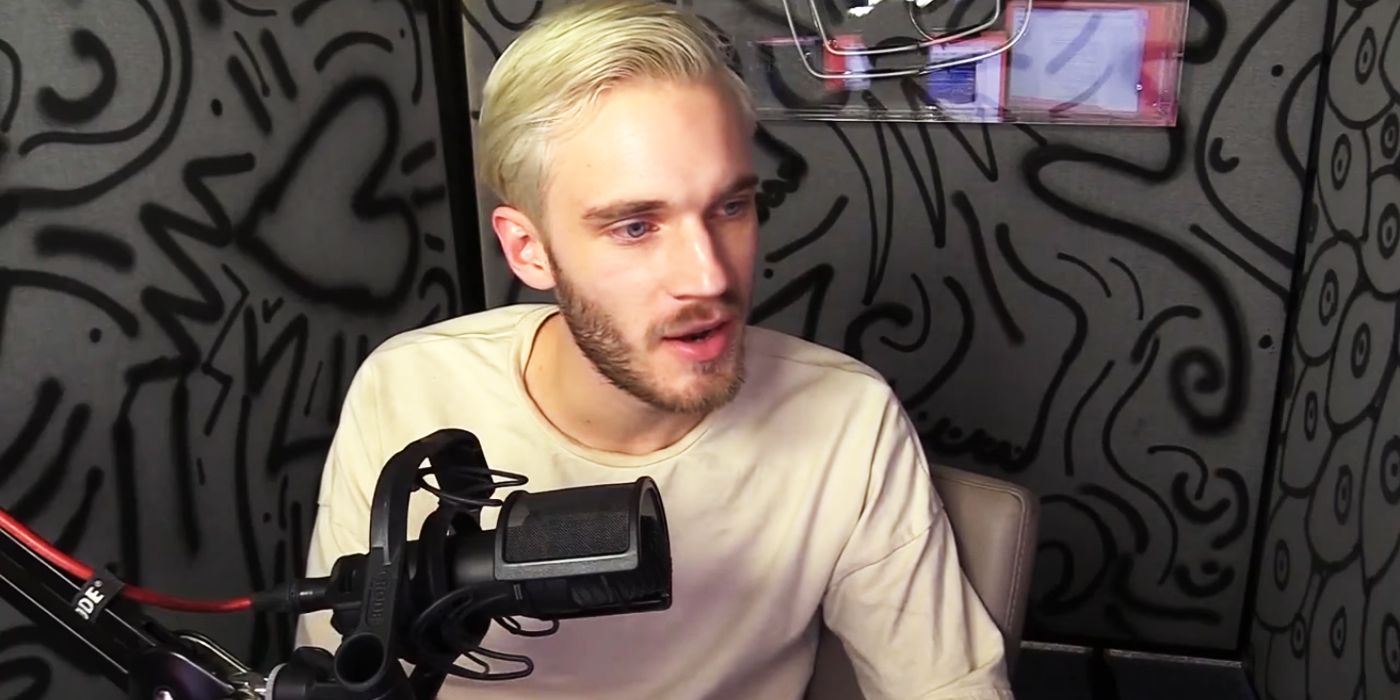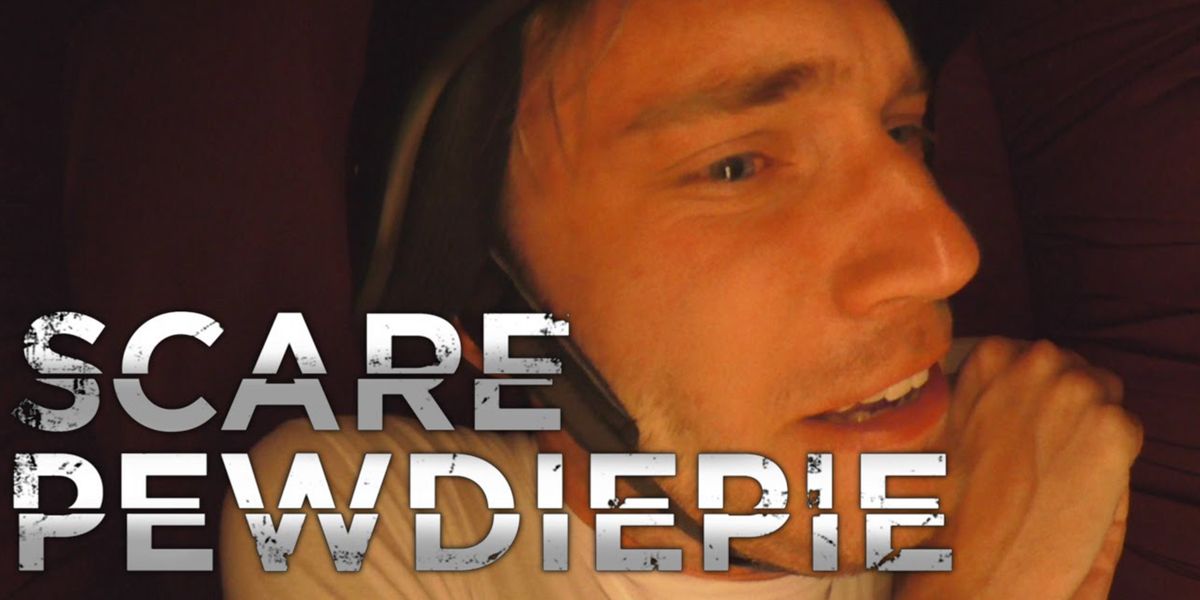PewDiePie has been a hot topic in the news ever since The Wall Street Journal released a report this week detailing anti-Semitic content uploaded to the famous YouTuber's channel. The man behind the persona, Swedish 27-year-old Felix Kjellberg, started his channel after dropping out of university in 2010. The channel, which features Kjellberg playing and reacting to video games in a "Let's Play"-esque format, is known for its goofiness and heavy profanity. PewDiePie has held the highest number of subscribers on YouTube for the past four years, reaching that milestone in December 2013 with 53 million followers.
However, Kjellberg -- and, to some extent, his following -- has come under fire recently for sharing anti-Semitic hate speech on his channel. As detailed in The Wall Street Journal, the famed creator encouraged several freelance creators to say explicitly anti-Semitic things, which he then shared with his followers. The publication also drew attention to Kjellberg's use of Nazi imagery in his videos, including videos in which he plays speeches by Adolf Hitler and dresses in a Nazi-like soldier's uniform. According to Kjellberg himself, however, this report was unfairly and incorrectly constructed to make him look bad.
In an 11-minute video statement released by the YouTuber, Kjellberg explains why the media is against him and how the WSJ misconstrued his content. He does issue an apology for one specific incident -- the infamous "guys-holding-up-the-sign" moment -- but spends most of the video railing against the media. You can check out the full video for yourself, above, or just keep reading for some key quotes.
Kjellberg's video begins with (and ends with, and primarily contains) the idea that the media is targeting him specifically because of his high profile online. According to Kjellberg:
"Old school media doesn't like Internet personalities because they're scared of us. We have so much influence, and such a large voice, and I don't think they understand it, and that's why they keep this approach to us...If there's anything I've learned about the media from being a public figure, it's that they blatantly misrepresent people for their own personal gain, even viciously attack people just to further themselves...Clickbait media is a huge problem, because all they need is a strong title. That's all that really matters."
He cites a previous interview with the WSJ, after which he was disappointed to learn that the article focused on his net worth. Says Kjellberg:
"Money's really all I've ever been acknowledged for...I literally raise millions of dollars to charities, that's rarely ever spoken about."
When it came to the media's accusations, though, Kjellberg was somewhat more apologetic:
"I want to address the biggest issue first, which I think is the whole guys-holding-up-the-sign thing. I'm sure you've seen it, it's been everywhere. A lot of people loved the video, and a lot of people didn't. And it's almost like two generations of people arguing whether this is okay or not. But, regardless of that, I just wanted to reiterate that my intention was just to show how stupid [Fiverr] is, and how far you could push it by paying five dollars. I am sorry for the words that I used, as I know they offended people, and I admit that the joke itself went too far. I do strongly believe that you can joke about anything, but I also believe that there's a right way and not-the-best way to joke about things. I love to push boundaries, but I would consider myself a rookie comedian, and I've definitely made mistakes like this before, but it's always been a growing and learning experience for me, and it's something that I actually learned to really appreciate, and I think this whole situation has definitely been that for me, and it's something that I'm going to keep in mind moving forward."
Although Kjellberg acknowledged he "took things to far," he goes on to claim that the WSJ's report was "an attack by the media to try and discredit me, to try and decrease my influence and my economic worth." Kjellberg was not particularly responsive to the revelation that white supremacist groups support his content. Instead, the YouTuber asserted that:
"Some people have said that these jokes are normalizing hatred. Regardless of if that's true or not -- spoilers, it's not, unless there's 53 million Nazis watching me for some reason -- a personal attack like this to portray me as anti-Semitic is doing no one a favor. [The Wall Street Journal is] targeting some Swedish guy that tries to be funny, most of the time, it doesn't really go well. Very offensive, but he means well...Personally, I think they are the ones normalizing hatred."
He ended the video with a characteristically explicit statement against The Wall Street Journal, and a tear-filled thank you to his fans and supporters.
While it's appropriate that Kjellberg apologized for one of the explicitly anti-Semitic statements he displayed on his site, the content creator appears to have a rather myopic view of the situation. Whether blissfully or strategically ignorant, Kjellberg failed to appropriately comment on his white supremacist following in this "response." Though he made a blog post stating, "I don't support [hate-based groups] in any way," the post was aimed at those criticizing his anti-Semitic content. Instead of speaking directly to his hateful followers and telling them he did not support their ideologies, the YouTuber addressed the media as though they were his most dangerous adversaries. He maintains that any claims of anti-Semitism from the media are "absurd."
It's plausible that PewDiePie is not a member of any hate groups, or even a person who understands political agendas of any kind. In all likelihood, he is, in fact, just a guy who makes stupid comments for the sake of sparking controversy. However, many of his supporters have responded to anti-Kjellberg criticism by acting as though accusations of fascism or Nazism imply that Kjellberg is going to meetings or planning direct and violent anti-Semitic action. On the contrary, if our current political climate proves anything, it's that the spread of hateful ideas is just as powerful and no less credible than any "direct" or in-person action against marginalized persons. Kjellberg may not be a dangerous individual, but his ideological recklessness and sprawling platform make his statements serious, regardless of whether or not they're "for the lols."
The Internet is a wild and weird place, and as old media struggles to catch up with the breadth and popularity of new media, journalism has undergone some major changes. However, whether each article's facts are thoroughly vetted or "cherry-picked," at the end of the day, it's still up to the readers to decide what to believe.
Source: PewDiePie, The Wall Street Journal



